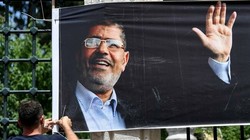 The Office of the United Nations High Commissioner for Human Rights (OHCHR) has called for an “independent and thorough” investigation into the sudden death of Egypt’s former President Mohamed Morsi, who died during a trial court session.
The Office of the United Nations High Commissioner for Human Rights (OHCHR) has called for an “independent and thorough” investigation into the sudden death of Egypt’s former President Mohamed Morsi, who died during a trial court session. RNA - “Any sudden death in custody must be followed by a prompt, impartial, thorough and transparent investigation carried out by an independent body to clarify the cause of death,” said Rupert Colville, spokesman for the OHCHR, on Tuesday.
Morsi, a senior figure in the now-outlawed Muslim Brotherhood organization, was Egypt’s first democratically-elected president after the 2011 revolution, which ousted former dictator Hosni Mubarak.
However, Morsi was deposed through a bloody military coup masterminded and orchestrated by his then-defense minister and now President Abdel Fattah el-Sisi in July 2013. Sisi was the head of military intelligence at the time of 2011 revolution.
Morsi, 67, had been serving a 20-year prison term on charges of ordering the arrest and torture of protesters, a 25-year jail term on charges of passing intelligence to Qatar and a three-year term for insulting the judiciary.
In November 2016, the Court of Cassation scrapped the life imprisonment sentence for Morsi and 21 other defendants, including some who had received the death penalty, in the same case and ordered a retrial.
Egypt's public prosecutor said the former president was pronounced dead at 4:50 p.m. local time (02:50 GMT) at the hospital on Monday, and that a medical report showed no apparent recent injuries on his body.
Morsi suffered from medical neglect during his imprisonment as well as poor conditions in prison.
Last year, a report by a panel of UK legislators and attorneys warned that the lack of medical treatment could result in Morsi's "premature death.”
They panel said that Morsi was being kept in solitary confinement for 23 hours a day, which under the UN guidelines, would classify as torture.
The Egyptian Interior Ministry declared a state of alert on Monday, notably in Morsi's home province of Sharqiya in the Nile.
Amnesty international has also called for fair, transparent, and comprehensive investigation into Morsi's death.
The Middle East Eye, citing an unnamed source, reported that the former president was to share some “secrets” with the judge but requested a closed session since they would breach national security. It added that Morsi had repeatedly appealed for such a session in the past but never been granted.
‘Premeditated murder’
Separately, the Muslim Brotherhood has labeled the death as a full-fledged murder. In a strongly worded statement on Monday, the organization has called on Egyptians to gather for a mass funeral. It said Egyptian authorities were responsible for Morsi's deliberate slow death.
UK-based Mohamed Sudan, of the banned organization, insisted the death was a case of “premeditated murder”, claiming that Morsi had been prevented from receiving medicine or prison visits and information about his health was kept under wraps.
Morsi “has been placed behind a glass cage (during trials). No one could hear him or know what is happening to him,” he said, adding, “He hasn't received any visits for months or nearly a year. He complained before that he doesn't get his medicine. This is premeditated murder. This is slow death.”
The Brotherhood, which fully supported Morsi, protested against the coup, but the pro-Morsi protests were brutally crushed in the August 2013 Rabaa massacre in which more than 800 civilians were killed.
Human rights groups have regularly criticized Sisi's government for cracking down on opposition activists and supporters of Morsi’s Muslim Brotherhood movement, which has been banned in the country.
In January, Amnesty International warned that Egyptians were facing an unprecedented crackdown on freedom of expression under Sisi's administration, saying the North African state had turned into an “open-air prison” for dissidents.
847/940